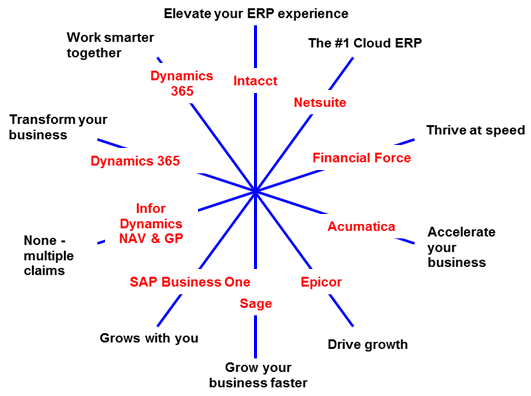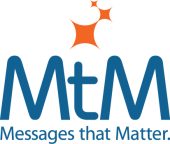Even the most obvious position is effective when it is executed consistently and repetitively in all marketing communications. It should be the theme for everything you do in marketing. Yet a compelling position stated once or twice on your website doesn’t move the needle in your effort to claim a position.
Due to lack of repetition, just one vendor evaluated in this annual assessment of the midmarket accounting and ERP (Enterprise Resource Planning) market is positioning effectively. Epicor stands out as a text book example of how to claim a position by repeating the same positioning concept – “grow your business” – over and over in all marketing communications, not just its website.
Repetition is probably the most important factor in claiming a position, that mental space in your target audience’s mind that you can own with an idea that has compelling meaning to your buyers. It’s in this mental space where your solution to the target audience’s most pressing problem meet and form a meaningful relationship. You can claim a position by executing your positioning statement consistently and repetitively over an extended period of time – at least 18 months and ideally for several years. While the “growth” position is a “no duh” position, Epicor owns due to repetition and consistent execution for several years.
Why everyone else is failing to claim a position
Epicor is the only vendor in this evaluation that truly has a position. Everyone else fails to claim a position either because they make multiple claims (which compete against each other) or state their position on the home page of their website and rarely mention it again. Intacct, which was bought by Sage after this blog was originally published, still makes an interesting claim – “elevate your ERP experience” – but uses it only once more on its website, and doesn’t prove its claim.
With the combination of Intacct and Sage, which has the potential to make SageIntacct (the new name) the No. 1 player in the midmarket, Sage and Intacct quickly posted this statement:
“The combination that delivers the first and last cloud Financial Management Solution your business will ever need.”
Acumatica is another example of failure to claim a position due to lack of repetition. “Accelerate your business” is clearly Acumatica’s position on its home page, however, it is not the theme of the website content, and rarely, if ever mentioned again.
Microsoft is a classic example of ineffective, conflicting positioning due to lack of repetition. Microsoft changes positions right on the home page of the Dynamics 365 website. “Work smarter together” is what you see at the top of the home page. A pretty good position gets sabotaged just below by the most “me-too” claim there is in B2B software marketing: “Drive your digital transformation with Dynamics 365.”
Without repetition, you have no position
What is the Dynamics 365 position? Given that Microsoft claims it helps transform every part of your business including products and processes, maybe it’s “transform,” but of course Microsoft doesn’t prove the claim. And Microsoft doesn’t repeat it enough to claim it.
There’s no way you can claim a position in your market without repeating it over and over. That’s because – according to Neuromarketing, a must-read book for B2B marketing professionals – the decision-making portion of the brain notices repetition and earmarks it as important.
The authors write that “even repetition of a few simple words sends a strong signal to the reptilian brain (which makes decisions), prompting it to note, ‘I should remember that.’ ” Learn more about Neuromarketing by reading a two-part series available on the MarketingProfs website.
Here is how the midmarket accounting and ERP vendors are positioned in July 2017 before the Sage acquisition of Intacct:

We’re No. 1 claims don’t work very well either
Most buyers only care about themselves and problems that a new accounting/ERP solution will solve. Therefore, inwardly focused positions about the company or the wonders of its products don’t resonate with most buyers. Even though Netsuite owns “#1 cloud ERP” due to sticking with it for several years, it’s questionable whether it is an effective claim. Same is true for the secondary claim FinancialForce makes on its home page: “The #1 cloud ERP on Salesforce.” The main claim (“thrive at speed”) probably won’t get buyer attention because it nebulous and never explained or repeated.
We know why repetition is critical in claiming a position thanks to Neuromarketing. The book also explains why an inwardly focused message to the market gets ignored by even those who prefer to make a safe decision by selecting the market leader. “…one hundred percent of your message should focus on your audience, not you,” according to Neuromarketing. “Your audience must hear what you can do for them before they will pay attention to you.” Therefore, buyers don’t care that you are No. 1 or the leader or the most innovative. They are in buy mode because they have a problem. Tell them how you solve it!
Conclusion – give repetition a chance to work its magic
The notion of “growth” is used with zeal by every vendor in the market, and since Epicor owns it, growth claims by competitors are likely to be associated with Epicor. Buyers aren’t discerning enough to realize that a vendor other than Epicor is making the “growth” claim. They associate “growth” with Epicor due to the power of repetition. That’s the benefit of not just stating a position but repeating it to the point you are sick of it. Then keep repeating it for an extended period of time! It’s the only way to claim a position in your market, and it is the most common mistake in B2B software marketing. Ironically, it’s pretty easy to repeat your position over and over. Give it try; it will set you apart from the competition while giving you ownership of the claim you keep repeating.
